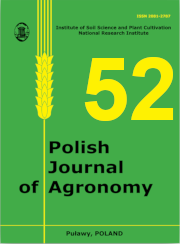Factors determining the occurrence and number of bacteria of the genus Azotobacter in the soil environment
Main Article Content
Abstract
Bacteria belonging to the genus Azotobacter are microorganismscommonly found in various soils all over the worldand capable of fixing atmospheric nitrogen. The biological nitrogenfixation (BNF) process annually supplies approximately140–170 million tons of this element to the nitrogen cycle, whichis of great importance from an ecological and practical point ofview. Although the efficiency of atmospheric nitrogen fixation byAzotobacter spp. is relatively high and amounts to 20 mg N per1 g of glucose used, these bacteria are sensitive to various environmentalfactors, including soil reaction, contents of organicmatter, soil humidity or nutrient content, and their abundance insoils is small. These bacteria secrete numerous biologically activesubstances into the soil environment, which have a beneficialeffect on the development of plants, which from the ecologicalpoint of view plays an important role in the functioning of agriculturalecosystems. An additional advantage of bacteria belongingto the genus Azotobacter, which speaks for their use in agriculture, is the ability to produce antifungal and solubilization ofinsoluble phosphates. Research on Azotobacter spp. proves thatthe concentration of hydrogen ions (pH) is a significant factorwhich determines the presence of this group of bacteria in thesoil environment. Many other soil properties have a large impacton the presence and development of this important agriculturalgroup of bacteria.The aim of the work was to systematize the knowledge on theknown occurrence conditions and ecological relationships andinteractions between environmental factors and the presence andabundance of Azotobacter bacteria in soils.
Article Details

This work is licensed under a Creative Commons Attribution-ShareAlike 4.0 International License.
The author grants the editorial staff of the Polish Journal of Agronomy (abbreviated as PJA) a non-exclusive and royalty-free license to use the author's copyright in the paper/printed and electronic versions of his/her work published in PJA in Poland and abroad, in whole or in any part, including placing the work in electronic databases/databases locally or available on the Internet, for an unlimited period of time in the fields of exploitation specified in article 50 of the Copyright and Related Rights Act.
Manuscripts published in Polish Journal of Agronomy are available under a Creative Commons Attribution-ShareAlike 4.0 (CC-BY-SA) license.

